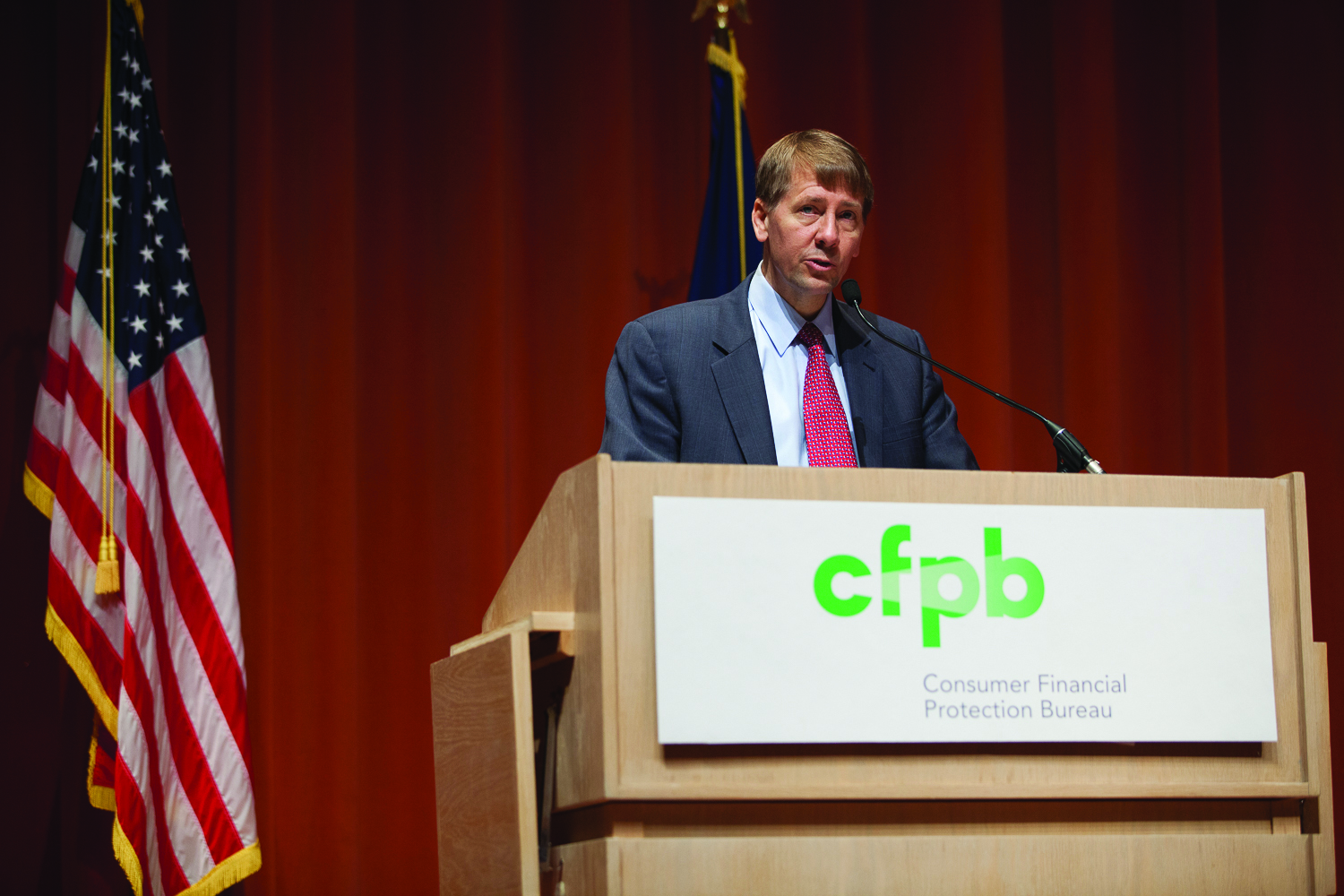Among the seven specific objections the American Financial Services Association made known to the Consumer Financial Protection Bureau, the organization concluded the threshold to determine what regulators consider to be a larger participant in auto financing should be raised significantly.
To recap, if a finance company makes, acquires or refinances 10,000 or more vehicle loans or leases in a year, the CFPB is looking to become that operation’s primary regulator stemming from a proposal disclosed during a bureau event back in September. This week, which was the end of the CFPB’s period for accepting public comment, the Structured Finance Industry Group joined AFSA in declaring the participation level should be lifted to 50,000.
“In order to avoid creating further regulatory burdens, uncertainty and potential restriction of access to credit for auto loans, the CFPB should make several changes to the proposed rule,” AFSA executive vice president Bill Himpler said in the comment letter to the CFPB that also was signed by Structured Finance Industry Group executive director Richard Johns.
“AFSA agrees with the bureau regarding the important role that automobiles and auto-related financing play in consumers’ lives, and in the country as a whole,” Himpler continued. “With this in mind, it is crucial that the CFPB exercise great care in crafting the final rule defining larger participants in the automobile financing market to avoid creating further regulatory burdens, minimize uncertainty for covered persons in that market, and potentially restrict consumers’ access to credit for these loans.”
Himpler then articulated the seven specific rule modifications for the CFPB to consider, including:
— Use the Regulation Z definition of “refinancing” as opposed to the proposed expanded definition.
— Retain the exclusion for asset-backed securities from the definition of “annual originations” and modify the exclusion to clearly cover asset-backed securities.
— Refrain from overreach regarding leases.
— Modify the test used to determine larger participants to ensure that it truly captures the “larger” participants who actually occupy the vast majority of the market.
— Change certain other definitions, including what is an automobile, a title loan and an affiliate.
— Provide additional detail on Experian Automotive’s AutoCount database and specifically exclude loans not made for the purpose of financing the purchase of automobiles or the refinancing of such original obligations from the database.
— Revisit the cost likely to be incurred by a larger participant experiencing supervisory activities by the bureau.
When Himpler elaborated about each of those seven recommendations, the AFSA officials shared some examples that might be of particular interest to finance company leaders. First, Himpler pointed out how the CFPB’s current metrics and definitions could place certain entities into two very different categories simultaneously.
“A threshold of 10,000, coupled with the overly broad definition of refinancing, is so low that covered persons who qualify as small businesses under the Small Business Administration’s definition could also qualify as larger participants under the proposed rule. If the definition of refinancing is not changed, even more small businesses have the potential to meet the definition of larger participant,” Himpler said.
“It seems contradictory that a covered person could be a small business and a larger participant at the same time,” he continued. “A small business that has less than $38.5 million in average annual receipts without question does not have more than 1 percent of the $900 billion automobile financing market share.
“It stretches credulity to conclude that such a small business with less than 1 percent of the market share should be considered a ‘larger’ participant in the entire market,” Himpler went on to say.
Himpler also touched on the CFPB’s expectations for what maintaining compliance is going to cost finance companies. The CFPB estimated total labor cost for an examination is about $27,611, requiring only a low-level compliance officer and a small fraction of an attorney’s fees.
However, Himpler said he reviewed CFPB statements and exam manuals. AFSA now believes the bureau expects a compliance officer that is a corporate executive with direct access to the finance company’s board.
“The salary for such a person would be much higher,” Himpler said. “Additionally, from what members of the industry have learned from their counterparts in other industries, a CFPB examination requires ‘all hands on board’ plus substantial outside counsel costs.”
Himpler mentioned several other resources finance companies might need, such as a number of in-house attorneys, business persons, IT professionals, outside counsel and outside consultants who could be directly involved with CFPB examinations.
So bottom line — how much might an examination cost?
“We believe, based on exam costs from companies in other industries, that a more accurate estimate for the cost of an examination would be $750,000 to $1 million,” Himpler said. “Larger and lengthier examinations can cost over $1 million in staff time and outside counsel and consultants.
“To be clear, this is independent of costs associated with the conclusion of memos of understanding or consent orders,” he continued. "The estimate in the proposed rule also totally ignores other costs, such as e-discovery, costs which are often astronomical.
“For a small business with $38.5 million or less in average annual receipts — even a half-a-million-dollar exam is a huge cost,” Himpler went on to say.
AFSA’s complete commentary to the CFPB can be downloaded here.
For more than a year, the Consumer Financial Protection Bureau, an unelected government agency tasked with regulating the consumer finance market, has doggedly pursued what it views as “disparities” in auto lending. On this issue, you have to respect their determination: They’ve let nothing stand in their way, including lack of evidence.
It came as no surprise, then, when earlier this week the CFPB finally formally accused Honda and Toyota of discriminatory loan practices. Honda confirmed that the CFPB is seeking, “monetary relief and implementation of changes to our discretionary pricing practices and policies.” More automakers could be named in the coming weeks.
Both Toyota and Honda are working with the federal government to achieve a resolution. I imagine they will ultimately pay a fine and agree to refine portions of their pricing practices. Perhaps they will even be forced to switch to flat fees, thereby punishing well-qualified consumers by denying them access to lower rates. Automakers know, just like the rest of us, that when the United States government paints a target on your back, the best thing to do is cooperate. It’s just too bad that in this case the automakers already share the CFPB’s commitment to fair lending.
Auto lending in the U.S. is a fair and well-organized process. How do I know? Well, for one thing, I’m a dealer who writes thousands of loans every year to satisfied customers. For another, I’ve seen the recent study by the American Financial Services Association (AFSA) that found the CFPB’s approach to identify loan discrepancies was deeply flawed. For example, the methodology they used to classify loan applicants as African-American borrowers was correct just 24 percent of the time.
You can check out the full study here, and be amazed, like me, that the CFPB continues to push this argument despite their astounding lack of reliable data.
There are a number of ways the CFPB could make a difference in the lives of American consumers. One of the first would be to increase opportunities for, and access to, comprehensive financial education for all Americans. Unfortunately, instead they have chosen to focus on and unfairly attack a single industry, perhaps enjoying the chance to see themselves righting social injustice in the nation’s headlines.
And why let truth stand in the way of an opportunity like that?
Larry Kull is the AIADA (American International Automotive Dealers Association) chairman. See this post and more at the Chairman’s Blog.
First, the Consumer Financial Protection Bureau and the U.S. Department of Justice delivered notices to Toyota Motor Credit Corp., alleging discriminatory practices regarding vehicle financing.
Now, American Honda Finance revealed it also received the same allegations from these federal regulators.
In documents filed with the Securities and Exchange Commission on Tuesday, officials from the CFPB and DOJ sent a letter to Honda’s captive finance company saying they have authorized enforcement actions alleging discrimination in automobile loan pricing to certain borrowers by dealers and alleging the loan pricing disparities were caused by AHFC’s business practices related to dealers.
AHFC officials added that they also have been informed that the agencies may defer pursuit of this litigation if the captive “works with the agencies to seek a voluntary resolution to these allegations.
“The agencies have informed AHFC that they are seeking monetary relief and implementation of changes to AHFC’s pricing practices and policies, which changes could affect AHFC’s business,” the company said in its SEC filing signed by Paul Honda, the captive’s vice president and assistant secretary.
“AHFC intends to continue to cooperate with the agencies to find a mutually agreeable resolution,” Honda added.
Just like Toyota’s captive arm, American Honda Finance indicated that it was previously contacted by the CFPB and DOJ regarding the agencies’ review of pricing practices by dealers originating retail installment sale contracts for vehicles.
“Their request for information and the ongoing review was to determine if pricing practices of dealers originating retail installment sale contracts for automobiles resulted in discriminatory pricing of these loans to certain borrowers in violation of applicable laws,” Honda’s captive said. “AHFC has voluntarily provided the information requested to date and cooperated with the agencies’ investigation.”
And just like Toyota Motor Credit, American Honda Finance currently is one of the top 20 market share holders. According to third-quarter data from Experian Automotive, AHFC ranked No. 7, holding 2.54 percent of the market.
Furthermore, Honda is extremely active in the leasing market as Experian indicated three of the automakers models — the Civic, Accord and CRV — led the way in market share for the most new-vehicle leases in Q3.
SubPrime Auto Finance News recapped Toyota’s letter acknowledgement earlier this week.
Hudson Cook is keeping a watchful eye on a pair of developments regarding debt collections and the regulatory impact on finance companies.
The firm indicated the Consumer Financial Protection Bureau and the Federal Trade Commission filed several enforcement actions relating to debt collection and the notice of proposed rulemaking on debt collection practices is expected shortly. In light of those developments, Hudson Cook is hosting a free webinar to explain what the potential impact could be.
The Hudson Cook partners set to be a part of the hour-long webinar that’s scheduled for 1 p.m. ET on Dec. 15 are:
— Lucy Morris, recent deputy enforcement director in the division of supervision, enforcement, and fair lending at the Consumer Financial Protection Bureau
— Joel Winston, former associate director of the FTC’s division of financial practices
— Barbara Sinsley, who is considered one of the nation’s leading attorneys on debt sales and collection practices.
The panel will be moderated by Gary Becker, former chief executive officer and general counsel of DCM Services who now is a Hudson Cook partner
“Those attending the webinar will learn about the recent enforcement actions and projected rulemaking related to debt collection,” Hudson Cook said. “The panel of experts will provide insight into enforcement actions and their implications for the debt collection industry.”
Finance company managers and debt collection staff members can register for the free webinar here.
At the same venue as Used Car Week, the National Automotive Finance Association awarded its Certified Consumer Credit Compliance Professional designation to its first graduating class following the completion of more than 24 hours of classroom training and 29 Web-based sessions.
The certification program was developed for the NAF Association by Hudson Cook and made possible by the financial support of the founding and sustaining sponsors.
The opening round of the program attracted students from banks and finance companies, dealers, device manufacturers and attorneys.
“We developed this challenging curriculum for those working in the auto finance industry to provide participants a valuable working knowledge of today's federal and state consumer financial services and compliance requirements, said Eric Johnson, Hudson Cook partner and co-curriculum developer and instructor.
“Those completing the program will be at the forefront of compliance preparation and training for themselves and the companies they represent,” Johnson continued.
Module 4 of the certification program was held in Las Vegas at the Red Rock Casino, Resort and Spa in conjunction with the SubPrime Forum.
The program's final module had 94 of the 141 enrolled program participants in attendance. Having completed this final stage of the program and all the required testing, the participants are now recognized as Certified Consumer Credit Compliance Professionals.
“The NAF Association has made a significant investment in this compliance program to assist the industry in facing the increasing regulatory requirements,” NAF Association executive director Jack Tracey said.
“The program was built to provide the best compliance education available,” Tracey continued.
Tracey went on to point out that Certified Consumer Credit Compliance Professionals become an important part of a company's compliance management system, demonstrating to regulators that a company's compliance staff has been able to meet the stringent requirements necessary to complete this program.
“The program offers great insight to the application of all consumer compliance regulations,” said program graduate Tony Myers of Regions Financial Corp.
The NAF Association is offering an opportunity to enroll in the program's next class which is being offered on Jan. 8 and 9 in Atlanta.
For information on the program curriculum and registration, visit www.nafassociation.com.
And for more information on the Consumer Credit Compliance Certification Program contact Tracey at (410) 865-5431 or [email protected].
The Consumer Financial Protection Bureau is hosting another field hearing, but the agency hasn’t yet shared what topic it will be discussing.
CFPB officials did indicate the event will be on Nov. 13 in Wilmington, Del. They added the hearing will feature remarks from director Richard Cordray, as well as testimony from consumer groups, industry representatives and members of the public.
The last time the CFPB conducted a field hearing like this one, the bureau took aim at the auto finance industry. That session on Sept. 18 in Indianapolis featured how the CFPB wants to increase its authority over finance companies while representatives from the American Financial Services Association and the National Dealers Association defended how the vehicle financing process currently works, including the use of dealer markup and underwriting of subprime customers.
BillingTree announced the next webinar in its series titled, Payment & Technology Spotlight Series — Technology and Innovation for the Digital Age.
With the upcoming segment putting the spotlight on compliance, BillingTree highlighted the free session will feature a virtual panel discussion by a group of leading industry professionals who will share their unique experiences and perspectives on major compliance topics which have an effect on any organization that falls under the Consumer Financial Protection Bureau’s oversight including collection agencies, lenders, auto financiers and credit unions.
The panel, which includes Charity Olson, managing attorney with the Olson Law Group and Jennifer Philips, financial services director with Ontario Systems Compliance Consulting, will hold in depth discussion on subjects such as Regulation E, the E-Sign Act and Convenience Fees.
Audience questions and participation are encouraged during the 60-minute live session.
The live webinar will take place on Nov. 18 at 1 p.m. ET, and participation is free of charge for industry professionals.
To register for this event, visit this website.
The Payment & Technology Spotlight Series is sponsored by BillingTree and was launched earlier this year with complimentary webinars including “Interactive Voice Response — Utilizing IVR Technology to Drive Agency Growth” and the “Three Virtual Virtues: Agents, Negotiation & Settlement.” Recordings of both session are available for replay upon request.
Companies interested in contributing to a future event in the Payment & Technology Spotlight Series can email [email protected].
While the first cohort will be completing the training at the same location as next month’s Used Car Week, the National Automotive Finance Association is now beginning enrollment for its next group of professionals who are looking to complete the Consumer Credit Compliance Certification Program.
NAF Association officials announced the first module of the program will be conducted on Jan. 8 and 9 at the Atlanta Airport Marriott in Atlanta.
After the day and a half of classroom-style learning in Atlanta for Module No. 1, participants will move onto the 29 self-paced Web-based sessions covering federal and state laws and regulations that govern the auto financing business. Successful testing throughout the program is necessary before progressing in the program.
The certification of Compliance Professional awarded upon completion of Module No. 4, a live classroom session covering the Consumer Financial Protection Bureau.
The NAF Association opened the program earlier this year and is on tap to close the first round of curriculum with that fourth module at the Red Rock Casino, Resort and Spa in Las Vegas, also the site of Used Car Week that begins on Nov. 10.
NAF Association executive director Jack Tracey explained why the compliance training is so important for finance companies to consider nowadays.
“A critical part of a compliance management system is staffing it with qualified compliance personnel,” Tracey said. “A company having their compliance officer(s) certified through a comprehensive educational program is a clear demonstration of the importance the organization places on compliance.”
This program is available to the staff of NAF Association member companies at the price of $2,000 per person and non-member companies at $2,600 per person.
Tracey noted registration rates for non-member companies are increasing. After Dec. 1, the cost for staff of non-member companies will be $3000.
“Register early to reserve your spot and avoid the registration increase,” Tracey said.
Executives and managers can complete the registration process by going to this website.
This week, the Consumer Financial Protection Bureau finalized a rule to promote more effective privacy disclosures from financial institutions to their customers. The new rule, which was proposed in May, allows companies that limit their consumer data-sharing and meet other requirements to post their annual privacy notices online rather than delivering them individually.
“Consumers need clear and accessible information about how their personal information is being used in the marketplace, but some of these requirements were redundant,” CFPB director Richard Cordray said. “Posting privacy notices online will make it easier for consumers to access these important policies, while also making it cheaper for financial institutions to provide disclosures.”
Officials recapped the Gramm-Leach-Bliley Act (GLBA) generally requires that financial institutions send annual privacy notices to customers. These notices must describe whether and how the financial institution shares consumers’ nonpublic personal information.
If the institution does share this information with an unaffiliated third party, it typically must notify consumers of their right to opt out of the sharing and inform them of how to do so.
Under the CFPB’s new rule, the bureau explained financial institutions will be able to post privacy notices online instead of distributing an annual paper copy, if they satisfy certain conditions such as not sharing data in ways that would trigger consumers’ opt-out rights.
Officials added the new rule applies to both banks and those nonbanks that are within the CFPB’s jurisdiction under the GLBA such as auto finance companies and institutions that offer vehicle financing. Institutions that choose to rely on this new method of delivering privacy notices will be required to use the model disclosure form developed by federal regulatory agencies in 2009.
Under the new rule, the CFPB indicated that if an institution qualifies for and wants to rely on the online disclosure method, it will have to inform consumers annually about the availability of the disclosures. Previously, institutions were required to send consumers a separate communication about privacy disclosures.
The bureau noted the new rule allows institutions to include a notice on a regular consumer communication, such as a monthly billing statement for a credit card, letting consumers know that the annual privacy notice is available online and in paper by request at a provided telephone number.
If an institution chooses not to use the new disclosure method, it will need to continue to deliver annual privacy notices to its customers using other delivery methods, according to the CFPB.
Officials went on to highlight the benefits of the new rule include:
• Constant access to privacy policies: Previously, consumers would receive a copy of their financial institution’s privacy policies once per year. If financial institutions choose the new alternative delivery method, consumers will be able to view their institution’s privacy policies at any time, while still receiving notices through existing delivery methods if the policies’ terms change. The online privacy notices will not require a login to view. For those customers with limited or no internet access, financial institutions will have to mail annual notices within 10 days to customers who request them by phone.
• Limited data sharing: If an institution shares data with unaffiliated third parties in a way that triggers customers’ rights to opt out of such sharing, then that institution generally would not be allowed to use the alternative delivery method. For this reason, financial institutions have an incentive to limit their sharing to reduce their costs.
• Educating consumers: When financial institutions post their privacy policies on their websites using the new delivery method, they must use the model disclosure form designed by federal regulators. The model disclosure form allows consumers who are concerned about their personal information to easily understand their financial institution’s privacy policy. Consumers can thus better educate themselves about the various types of privacy policies.
• Cheaper for companies to notify consumers of privacy practices: The CFPB anticipates that the rule will reduce the cost for companies to provide annual privacy notices. The Bureau estimates that about $17 million could be saved by the industry annually if institutions choose the new online disclosure method.
The bureau is finalizing the rule largely as it was proposed in May, with a number of technical, clarifying, and minor revisions. The rule will be effective immediately upon publication in the Federal Register.
The final rule is available here.
As more major retailers are being hacked for consumer information, Dealertrack Technologies made five recommendations to help dealerships protect themselves, their customers, store data and ultimately, profitability.
Among the five steps shared by Sharon Kitzman, vice president and general manager of DMS for Dealertrack, were:
— Create privacy notices that address the sharing of data.
— Carefully vet and contractually bind partners to confidentiality and specified, limited use of dealer data.
— Limit partner access to only those data modules required for them to perform the contracted-for services.
— Reserve the right to restrict access to data as your business needs change.
— Terminate access to your dealer data immediately at the end of a relationship.
“The combination of smart technology and smart data sharing and security practices is your best defense against lost or stolen customer and dealer data,” Kitzman said in a blog post on the company’s website. “By demonstrating to customers that you can practically and confidently protect their information, it will go a long way in winning their confidence and future business.”
Kitzman emphasized these practices are important because some partners may claim that they need to own or have irrevocable license to dealer data.
“Others may want to hide what data they are pulling and how they are using it, and many charge exorbitant amounts to integrate your data — data that belongs to you — into their systems,” Kitzman said.
“The bottom line is that you need to inspect your own dealership’s data practices to ensure that your technology partners are doing only what you approve,” she went on to say.
Kitzman’s colleague from Dealertrack — Michael Collins — likely will be talking about data security and more during his afternoon keynote presentation at the SubPrime Forum, the Used Car Week segment dedicated to the financing side of the business.
Collins, Dealertrack’s senior vice president of F&I solutions, will be asking the question, “Is today’s subprime market the ‘new normal?” Collins will deliver a unique perspective on how the subprime market has helped to fuel the auto industry’s recent success. He will deliver trends seen in both used-vehicle and subprime financing, share insights of how the in-store to online financing process has begun to transform the way consumers conduct their vehicle purchase, and also review what is in store for 2015.
Collins’ presentation is one of the many highlights of the SubPrime Forum, an event orchestrated in partnership with the National Automotive Finance Association.
This three-day conference will provide data, knowledge, insight and powerful business networking opportunities to spur innovation and drive growth in the growing subprime auto finance marketplace. Presented by SubPrime Auto Finance News and SubPrimeNews.com, and in affiliation with the NAF Association, the event will offer a best-in-class forum for executives and thought-leaders in the auto finance vertical.
The SubPrime Forum is set for Nov. 10 through Nov. 12 at the Red Rock Casino, Resort and Spa in Las Vegas. It’s a part of Used Car Week, which includes the CPO Forum, the Re3 Conference and the National Remarketing Conference.
All member-company staff of the NAF Association are $100 eligible for a discount of off the standard registration fee for the SubPrime Forum. Use discount code NAF2014 when registering.
Also, be sure to make your hotel reservations at the Red Rock Casino, Resort and Spa before Oct. 17 to secure your room at the exclusive conference rate of $195/night.
Click here for additional information regarding the SubPrime Forum, including the agenda, scheduled speakers and exhibitors.












